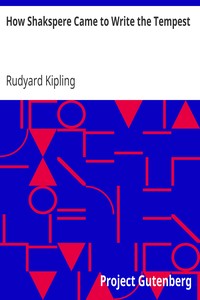How Shakspere Came to Write the Tempest by Rudyard Kipling
"How Shakspere Came to Write the 'Tempest'" by Rudyard Kipling is an insightful essay written in the early 20th century that explores the creative genesis of Shakespeare's play, "The Tempest." It serves as a critical analysis and reconstruction of the inspiration behind the work, delving into the confluence of Shakespeare's imagination, the influences of his time, and the real-life events that may have sparked his creativity. Kipling's essay forms part of the
"Papers on Playmaking" series published by the Dramatic Museum of Columbia University. In this essay, Kipling posits that Shakespeare drew upon various mundane and prosaic sources to depict the enchanting world of "The Tempest." He imagines a scenario where a stage manager overhears a drunken sailor recounting tales of shipwrecks and mysterious islands, suggesting that such conversations may have inspired the play's elements. Kipling meticulously connects the characters and events within "The Tempest" to the sailor's narrative and the broader context of Elizabethan drama and spectacle. Ultimately, he argues that the intertwining of reality and imaginative creativity is what birthed this profound theatrical work, showcasing Shakespeare's unique ability to transform the ordinary into the extraordinary. (This is an automatically generated summary.)
Read or download for free
| How to read | Url | Size | |||
|---|---|---|---|---|---|
| Read now! | https://www.gutenberg.org/ebooks/32991.html.images | 68 kB | |||
| EPUB3 (E-readers incl. Send-to-Kindle) | https://www.gutenberg.org/ebooks/32991.epub3.images | 119 kB | |||
| EPUB (older E-readers) | https://www.gutenberg.org/ebooks/32991.epub.images | 117 kB | |||
| EPUB (no images, older E-readers) | https://www.gutenberg.org/ebooks/32991.epub.noimages | 99 kB | |||
| Kindle | https://www.gutenberg.org/ebooks/32991.kf8.images | 264 kB | |||
| older Kindles | https://www.gutenberg.org/ebooks/32991.kindle.images | 252 kB | |||
| Plain Text UTF-8 | https://www.gutenberg.org/ebooks/32991.txt.utf-8 | 58 kB | |||
| Download HTML (zip) | https://www.gutenberg.org/cache/epub/32991/pg32991-h.zip | 115 kB | |||
| There may be more files related to this item. | |||||
About this eBook
| Author | Kipling, Rudyard, 1865-1936 |
|---|---|
| Author of introduction, etc. | Thorndike, Ashley Horace, 1871-1933 |
| LoC No. | 16024449 |
| Title | How Shakspere Came to Write the Tempest |
| Credits |
Produced by Chris Curnow, Joseph Cooper and the Online Distributed Proofreading Team at www.pgdp.net. |
| Reading Level | Reading ease score: 65.9 (8th & 9th grade). Neither easy nor difficult to read. |
| Language | English |
| LoC Class | PR: Language and Literatures: English literature |
| Subject | Shakespeare, William, 1564-1616. Tempest |
| Category | Text |
| EBook-No. | 32991 |
| Release Date | Jun 27, 2010 |
| Most Recently Updated | Jan 6, 2021 |
| Copyright Status | Public domain in the USA. |
| Downloads | 231 downloads in the last 30 days. |
| Project Gutenberg eBooks are always free! | |

